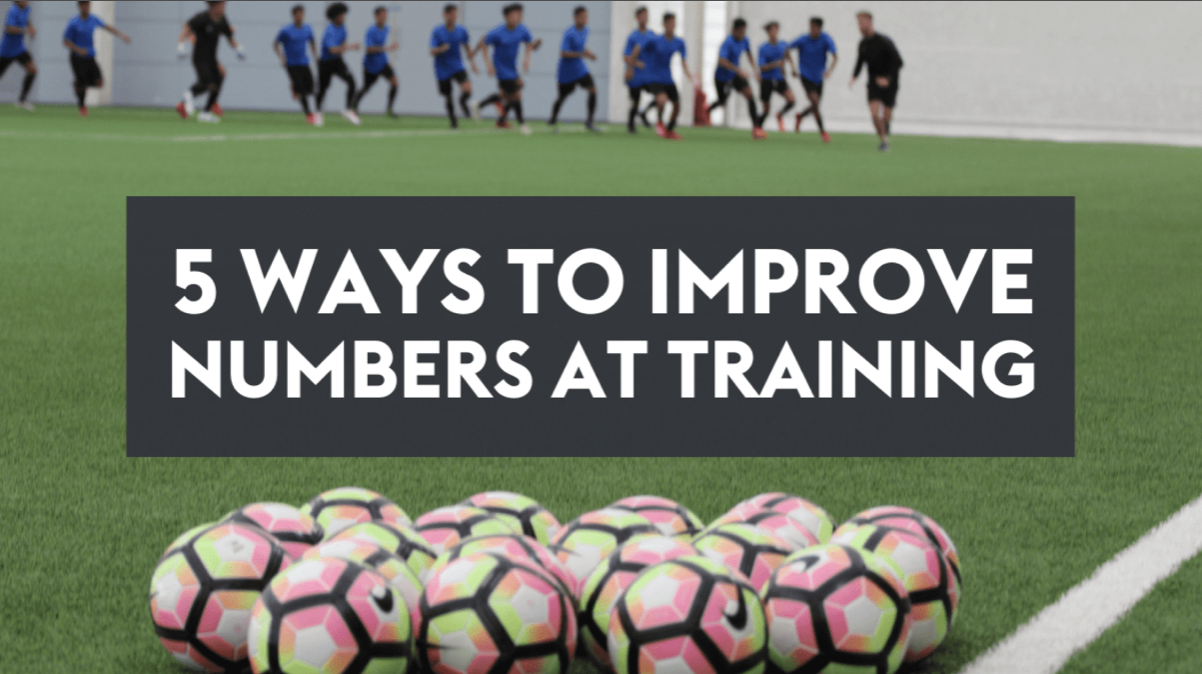Lack of motivation, other commitments, laziness, lack of enjoyment in the sport are just some of the factors that can lead to players skipping training sessions. This article looks at ways coaches can improve attendance at training.
When a few players start to miss training sessions this can be frustrating for a coach as it can disrupt their planned sessions. It can even hamper the overall development of the group as the players who do turn up every week are getting shorted/adapted versions of the sessions that won’t have the same impact on their technical development.
Therefore, coaches must do everything in their power to encourage full turnouts to training every week. Read on for some simple ways to try and do this.
1. Make training unmissable!
Especially at a young age the aim of the coach first and foremost should be to ensure that the players are having fun at training sessions. Incorporating fun practices at training that will make players want to attend the sessions week in week out is so important.
In addition, coaches need to remember that these practices should simultaneously work on improving their technical abilities to continue their development as players.
Tying these two things together can be difficult to do on a regular basis which is why some coaches struggle to keep their sessions engaging for players throughout the course of the season.
The Coaching Manual is the perfect tool for coaches who struggle with this problem. Check out our library of fun and engaging sessions for all age groups here. If you struggle with planning sessions check out this article to see how easy it is or sign up to The Coaching Manual to have access to our session planning tool.
2. Speak to parents
In most situations, a player's lack of attendance at training can have something to do with their parents. It could be that they are otherwise occupied so can’t arrange transport to training, they can’t afford subs/membership for the season, they don’t want their child playing football or some other reason.
Therefore, it’s important for coaches to make contact with these parents to offer any support that they can. Whether that’s arranging lifts to train every week with other parents, providing financial support or just reassuring them of the physical and mental benefits their child will receive from training with their teammates regularly.
Check out this guide which helps to improve the relationship between coaches and parents.
3. Set clear rules and expectations
At the start of the season or the first time you coach a set of players, it’s important to lay out a clear set of rules and standards you expect from a group of players.
It doesn’t have to be anything too strict, remember it’s important that the players are having fun, but just some simple rules to follow which will benefit both you as a coach but also your players.
One main rule to stick by, especially if you are experiencing low numbers at training is:
“You don’t train, you don’t play.”
It can often be the case that some players just think they can turn up on Saturday and start the game without training in midweek. A good way of stopping this from happening is putting these players on the bench or even dropping them from the squad if their attendance at training gets really bad. This should show them the importance of training with the team every week.
4. Set goals and expectations
If coaches set out targets for the team at the start of the season and continue to work towards this every week it can help to motivate players and give them focus which should lead to them wanting to attend training.
It can also be useful to give individual players targets for the season whether that’s a certain number of goals/assists/clean sheets for the season or to just improve certain aspects of a player’s game - passing, crossing, shooting etc. While you’re at it inform them how going to training every week will help them to achieve these targets.
5. Set an example
Providing your players with the best learning environment possible every time they train is an important job for a coach. For example, making sure you have the right equipment every week - enough bibs, cones, fully pumped up balls etc.
Players may lose the motivation to train if there isn't the proper equipment at training sessions. The little things at training are also important so that you can set a good example for the players to follow. For instance, make sure you are early for training so you are there before the players.
Also, make sure you are communicating in the right ways with players in order to maintain positive relationships with them and to ensure they are comfortable with you and at training. Check out this article for ways to better communicate with your players.
Get content like this and more with a Premium subscription!
- Our LMA Masterclass series featuring sessions from David Moyes, Rene Meulensteen, Alan Irvine, Steve McClaren, and more
- Access to 100s of other exclusive sessions
- Full access to our session creation and season-planning tools
- The same coaching content used by the Professional Footballers' Association
- Coaching Focus Web Series (All Seasons)
For the equivalent of just £5 ($7) a month when you pay annually, sign up and start taking advantage of all that The Coaching Manual has to offer today!


